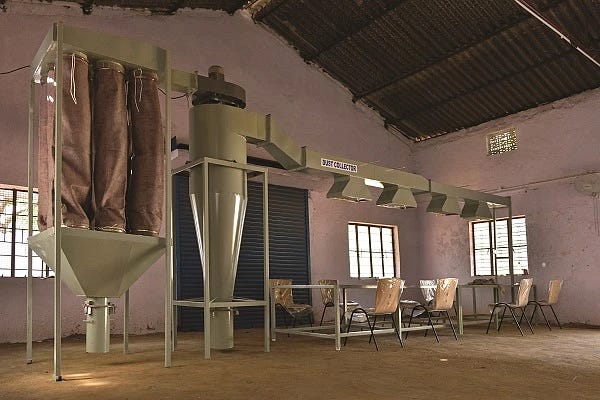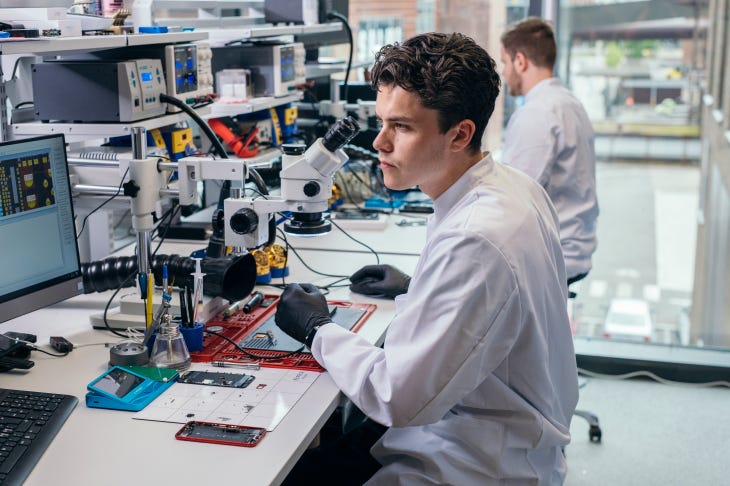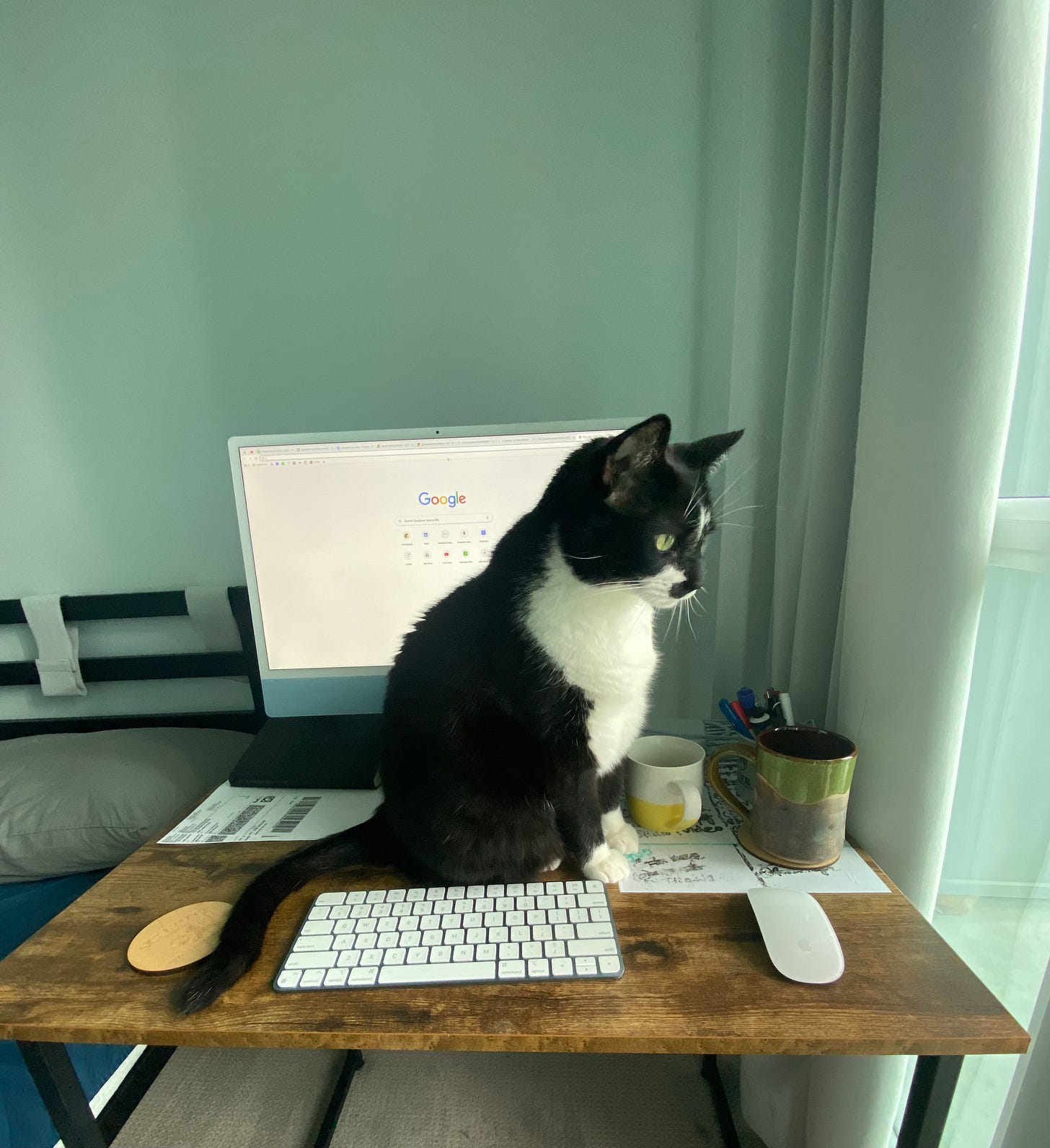What happens to your old phones and laptops?
Where do they end up eventually?
The world dumped 53.6 million tons of e-waste in 2019- that’s the official number. The unofficial one could be much higher.
And out of that, roughly 15% was recycled.
Countries in Asia and Africa serve as dumping grounds for these electronics.
It ends up in informal sectors in these countries.
There are workers that take apart precious metals like gold, silver, and tin from these products using their bare hands, a hammer, and pliers.
Broken motherboards can’t be sent for further processing. Without protective gear, workers dip them in a beaker filled with acid, hoping to extract copper, silver, or other metals that can be sold.
Children go through the leftovers and collect and sell less valuable plastic pieces obtained from these gadgets.
The constant contact with metals, acid, and other dangerous substances impacts their health and living conditions.
They suffer from skin infections and chronic obstructive pulmonary disease (COPD).
Next time you dispose of your electronics, picture a child in some part of the world risking their lives to extract valuable materials from it.
How long do you usually use your gadgets? What do you do at the end of its life?
Let’s see how these three startups are building innovative solutions to tackle this ⬇️
🥼Recovering gold from the urban mine
We are sitting on a gold mine…The e-waste contains many valuable raw materials like gold. In fact, the concentration of gold in e-waste is ~100 times more than its concentration in gold ores dug out of Earth. As a vast majority of e-waste goes unrecycled, precious metals worth billions are lost due to that.
Turning trash into treasure…New Zealand-based urban mining company Mint Innovation has developed a novel biotechnological solution that uses inexpensive chemicals and microbes to extract precious metals from e-waste. Once they receive the e-waste, it’s weighed and milled to a sand consistency to enable rapid metal recovery.
Precious metals including gold, palladium and platinum are dissolved using Mint’s proprietary chemistry.
Extracted precious metals are refined to pure metal for immediate sale.
Once the metals are recovered, the e-waste supplier receives payment for all recycled metals.
Creating a circular economy…Mint's mission is to set up biorefineries in all major cities across the world. These refineries will take the e-waste from the local communities, extract the precious metals from it and then sell them back to local businesses such as jewellers and manufacturers. Their local presence brings down the shipping cost and time to recycle for e-waste aggregators- creating a low-impact, low-waste, low-carbon alternative to traditional methods.
♻️Creating a distributed recycling model for e-waste
Informal recycling practices… In most developed nations, the standard 3-step recycling process exists- collecting e-waste, transporting it to a central location and processing it. It’s highly effective but it takes up significant financial resources that developing nations can’t afford. As a result, informal recycling practices have emerged in these countries.
A decentralized model… India alone produces around 2 million tons of e-waste annually, ~90% of which ends up in the informal sector. While regulations exist for e-waste disposal for bulk manufacturers, small retailers and consumers still don’t know their role. Bengaluru-based Binbag is creating a decentralized model to treat e-waste produced by Small & Medium Enterprises(SMEs).
They have 3 recycling units that are strategically situated across different parts of the country
It provides end-to-end service from evaluation, collection, recycling and compliance for computers, laptops, AC
It protects the sensitive data before disposal with their data degaussing & destruction service
The growth trajectory… Binbag runs its own Pollution Board-approved recycling units to ensure recycling is done in compliance with the law. To cater to customers in tier 2 & 3 cities, they plan to work with smaller distributed recycling units that are already functional in these cities.
📱An end-to-end online marketplace for refurbished iPhones
Do we need a new phone?… Most people update their phones every ~21 months. If they end up in a landfill, precious metals are lost and they contaminate the environment. Moreover, the production of new smartphones takes up additional resources and emits greenhouse gases. Research shows that extending a mobile phone’s life from 1.8 to 4.5 years can halve the carbon footprint of the phone’s life cycle.
A cheaper, environment-friendly option…The smartphone market in Europe is over €100 billion. The used/refurbished market makes up only 10% of it. Finnish startup Swappie is on a mission to change that %age.
It collects used iPhones from individuals and private organizations,
It repairs them in its own factory and resells them directly to consumers with a 12-month warranty (controlling the entire value chain).
If the collected phones cannot be reused, they are used for spare parts and are then taken to e-waste disposal points.
Win-Win-Win… Trust plays a key role when it comes to purchasing refurbished goods. Swappie is building that by controlling the entire value chain, providing warranty and free return options to the end-user and ensuring that these refurbished phones work as well as new ones. The sellers earn by selling their old phones to Swappie and the customers get a phone at a discounted rate while saving the environment.
🙋Trivia of the week
Among the top 5 coal-producing nations are China, India, US and Australia.
The fifth one is an island nation, which consists of over 17000 islands and is the 14th largest country in the world.
In January 2022, they also announced a month-long ban on the export of thermal coal.
This was surprising because historically the country produces far more coal than can be consumed domestically and exports the surplus.
The reason was that PLN, the state-owned electric company which generates the majority of the country’s power and relies heavily on fossil fuels, said its stock was running critically low.
Not surprisingly, it’s in the Top 10 most polluting nations as well.
Which nation are we talking about here?
Thanks for reading today’s edition. If you liked it, please share it with your network.
Hit that 💚 if you learnt something new today.
Thanks and see you next week😄








